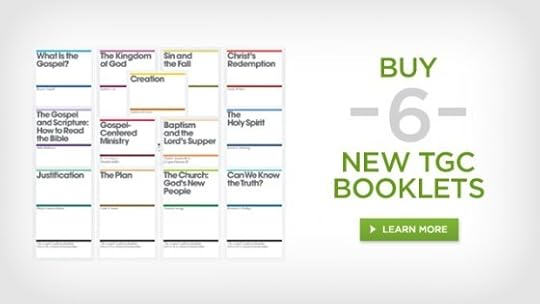Justin Taylor's Blog, page 298
August 16, 2011
Gossip vs. Flattery
Gossip involves saying behind a person's back what you would never say to his or her face.
Flattery means saying to a person's face what you would never say behind his or her back.
—R. Kent Hughes, Disciplines of a Godly Man, 10th anniversary ed. (Wheaton, IL: Crossway, 2006), p. 139.
Debate between Wallace and Ehrman on the Reliability of the NT Text
Press release:
The Center for the Study of New Testament Manuscripts (CSNTM) is proud to announce the SMU Debate between two noted New Testament scholars, Dr. Bart D. Ehrman and Dr. Daniel B. Wallace. The debate will be held on Saturday, October 1, 2011 at 7 PM in the McFarlin Memorial Auditorium at Southern Methodist University. This debate will feature a dialogue on the reliability of the text of the New Testament. Though Ehrman and Wallace have held public debates in the past, this one will focus on providing a general audience with insider information regarding one of the most significant pieces of literature ever written.
Dr. Ehrman, the James A. Gray Distinguished Professor of Religious Studies at the University of North Carolina Chapel Hill, is a New York Times bestselling author who has published over 20 books. His book, Misquoting Jesus: The Story behind Who Changed the Bible and Why, questioned the reliability of the New Testament text, arguing that Christian scribes have corrupted it beyond repair.
Dr. Wallace, director of the Center for the Study of New Testament Manuscripts and New Testament Professor at Dallas Theological Seminary, has spent his life studying and digitizing ancient copies of the New Testament. He has authored and edited numerous books; most recently he has edited and contributed to Revisiting the Corruption of the New Testament: Manuscript, Patristic, and Apocryphal Evidence. He asserts that we have good reason to believe that the New Testament text is reliable.
If you are interested in the New Testament and its reliability, this is sure to be an event you will not want to miss. For more information on the debate and to purchase tickets, please visit www.smudebate.com.
50% Off The Gospel Coalition Booklets
WTS Books is offer the six new TGC booklets for 50% off (one week only; sale ends Tuesday, August 23). The series is edited by D.A. Carson and Tim Keller.
The new booklets are:
Baptism and the Lord's Supper by Thabiti Anyabwile & J. Ligon Duncan
Justification by Philip Ryken
The Kingdom of God by Stephen Um
Sin and the Fall by Reddit Andrews
Christ's Redemption by Sandy Willson
The Gospel and Scripture: How to Read the Bible by Mike Bullmore
You can go here to read samples.
The full 14-booklet set is available here.
How Big Is the Sun Compared to the Earth?
One million Earths could fit inside the size of the sun.
"Yours is the day, yours also the night;
you have established the heavenly lights and the sun."
—Psalm 74:16
August 15, 2011
God Didn't Make a Mistake
Encouragement for Pastors Tempted with Depression
The closing exhortations of Charles Spurgeon's priceless counsel on "The Minister's Fainting Fits" in Lectures to My Students:
The lesson of wisdom is, be not dismayed by soul-trouble.
Count it no strange thing, but a part of ordinary ministerial experience.
Should the power of depression be more than ordinary, think not that all is over with your usefulness.
Cast not away your confidence, for it hath great recompense of reward.
Even if the enemy's foot be on your neck, expect to rise amid overthrow him.
Cast the burden of the present, along with the sin of the past and the fear of the future, upon the Lord, who forsaketh not his saints.
Live by the day—ay, by the hour.
Put no trust in frames and feelings.
Care more for a grain of faith than a ton of excitement.
Trust in God alone, and lean not on the reeds of human help.
Be not surprised when friends fail you: it is a failing world.
Never count upon immutability in man: inconstancy you may reckon upon without fear of disappointment.
The disciples of Jesus forsook him; be not amazed if your adherents wander away to other teachers: as they were not your all when with you, all is not gone from you with their departure.
Serve God with all your might while the candle is burning, and then when it goes out for a season, you will have the less to regret.
Be content to be nothing, for that is what you are.
When your own emptiness is painfully forced upon your consciousness, chide yourself that you ever dreamed of being full, except in the Lord.
Set small store by present rewards; be grateful for earnests by the way, but look for the recompensing joy hereafter.
Continue, with double earnestness to serve your Lord when no visible result is before you.
Any simpleton can follow the narrow path in the light: faith's rare wisdom enables us to march on in the dark with infallible accuracy, since she places her hand in that of her Great Guide.
Between this and heaven there may be rougher weather yet, but it is all provided for by our covenant Head.
In nothing let us be turned aside from the path which the divine call has urged us to pursue.
Come fair or come foul, the pulpit is our watch-tower, and the ministry our warfare; be it ours, when we cannot see the face of our God, to trust under THE SHADOW OF HIS WINGS.
[See also this helpful series, "Depression and the Ministry" at TGC.]
Why Joni Eareckson Tada Wants to Bring Her Wheelchair to Heaven
Joni, from her moving booklet Hope . . . The Best of Things:
 I sure hope I can bring this wheelchair to heaven.
I sure hope I can bring this wheelchair to heaven.
Now, I know that's not theologically correct.
But I hope to bring it and put it in a little corner of heaven, and then in my new, perfect, glorified body, standing on grateful glorified legs, I'll stand next to my Savior, holding his nail-pierced hands.
I'll say, "Thank you, Jesus," and he will know that I mean it, because he knows me.
He'll recognize me from the fellowship we're now sharing in his sufferings.
And I will say,
"Jesus, do you see that wheelchair? You were right when you said that in this world we would have trouble, because that thing was a lot of trouble. But the weaker I was in that thing, the harder I leaned on you. And the harder I leaned on you, the stronger I discovered you to be. It never would have happened had you not given me the bruising of the blessing of that wheelchair."
Then the real ticker-tape parade of praise will begin. And all of earth will join in the party.
And at that point Christ will open up our eyes to the great fountain of joy in his heart for us beyond all that we ever experienced on earth.
And when we're able to stop laughing and crying, the Lord Jesus really will wipe away our tears.
I find it so poignant that finally at the point when I do have the use of my arms to wipe away my own tears, I won't have to, because God will.
Gospel-Centered Sanctification
I appreciated Sean Lucas's contribution to the conversation represented by Kevin DeYoung, Tullian Tchividjian, and others on gospel-centered sanctification and grace-driven effort—especially this:
I mention all of this to simply say: this is a historical disagreement. It is not recent, not the result of misbegotten, misspent fundamentalist childhoods, not the offshoot of strange Lutheran strains in a pure Reformed stock. I tend to think that the differences are simply matters of emphasis: some lead with imperatives and others lead with indicatives; but both sides hold the indicative-imperative relationship together.
If we can recognize that the other "side" holds a legitimate perspective in the Reformed tradition that is largely a matter of emphasis, then we can approach each other with love, respect, and gratitude. We can avoid lumping them into pejorative groups (legalist, neo-nomian, antinomian, cheap grace, moralist), and we can recognize the temptation in our own approach that might lead us to become "imbalanced"—either by overemphasizing indicative to such a point that we fail to say what the Bible says in Colossians 3:5-17; or by overemphasizing the imperative to such a point that we fail to say what the Bible says in Colossians 3:1-4.
10 Reasons to Stop Defining Yourself by What You're Against
Pastor Byron Yawn, a self-described "recovering fundie," explains 10 effects of the "angry prophet" type who defines himself by what he's against:
You'll forget to talk about what's good . . . especially about Jesus.
You'll begin to take yourself too seriously.
You'll begin to preach the same sermon from every passage.
You'll foster mean people.
You'll eventually assemble an audience of self-congratulatory clones.
You'll take all correction personally and as an unpardonable offense against "God's man."
You'll make a terrible shepherd.
You'll become the type of person you warn others about.
You'll thrive on controversy.
People will stop listening.
You can read his explanation of each point here.
HT: Jared Wilson
Why Are There Not More Riots?
C.S. Lewis, in his prophetic The Abolition of Man (1943):
And all the time—such is the tragi-comedy of our situation—we continue to clamour for these very qualities we are rendering impossible. You can hardly open a periodical without coming across the statement that what our civilization needs is more 'drive', or dynamism, or self-sacrifice, or 'creativity'. In a sort of ghastly simplicity we remove the organ and demand the function. We make men without chests and expect of them virtue and enterprise. We laugh at honour and are shocked to find traitors in our midst. We castrate and bid the geldings be fruitful.
Brad Green comments:
. . . A culture—the UK or otherwise—cannot generation after generation laugh at honour and virtue and then be surprised that a culture has produced people who have no interest in honor or virtue. The most foundational question is not, "what caused these riots?", but rather, "why are there not more riots?" That is, a culture that systematically and repeatedly and thoroughly laughs at virute and honor should not be surprised when they look up to see traitors in their midst. We cannot make "men without chests" and then be surprised to see them face-to-face. May God help the UK, and all of us.
See also Theodore Dalrymple's comments in The Spectactor:
I doubt there are many people who have never in their lives experienced the pleasure of inflicting some kind of pain on others, physical or mental, from sheer malice and delight in doing so. It is an urge that we overcome first by effort and then by habit.
It is one of the tasks of civilisation to tame our inherent savagery. But who, contemplating contemporary British culture, would recognise in it any civilising influence, or rather fail to recognise its opposite? It is a constant call to and celebration of degradation, not only physical but spiritual and emotional. A culture in which Amy Winehouse, with her militant vulgarity and self-indulgent stupidity, combined with a very minor talent, could be so extravagantly admired and feted, is not one to put up strong barriers against our baser instincts, desires and urges. On the contrary, that culture has long been a celebration of those very urges. He who pays the savage never gets rid of the savagery; and this is only the beginning.
Justin Taylor's Blog
- Justin Taylor's profile
- 44 followers






